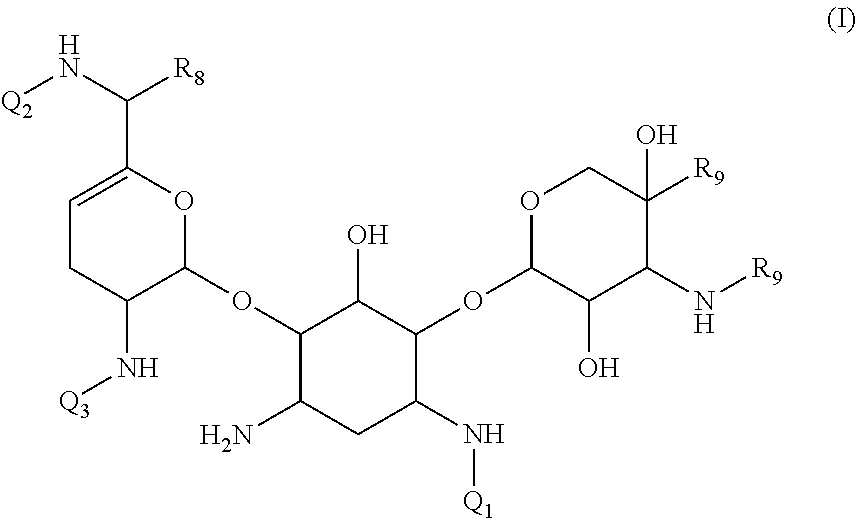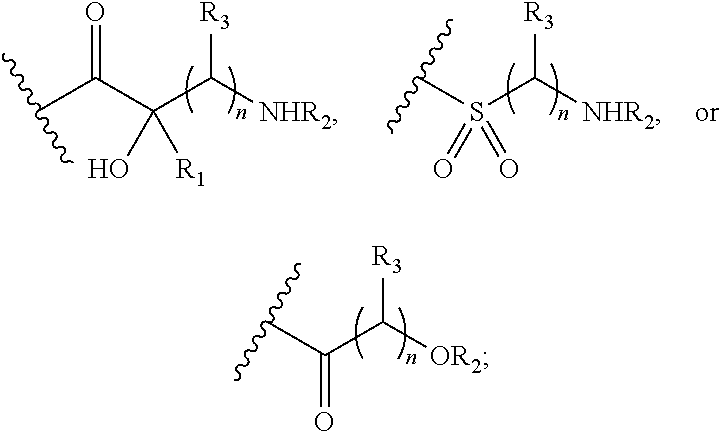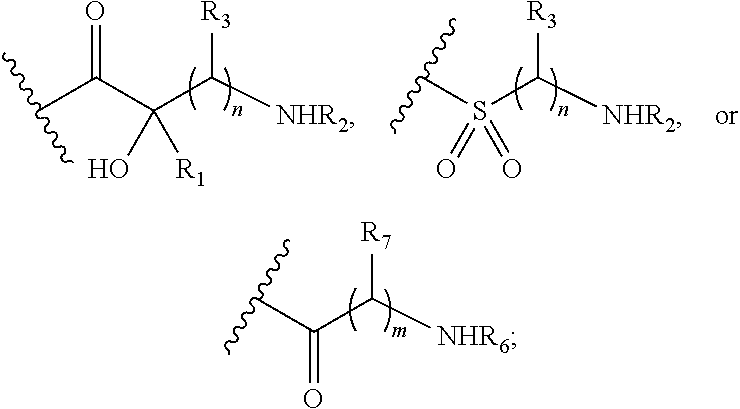Combination therapies using antibacterial aminoglycoside compounds
a technology of aminoglycosides and compounds, applied in the direction of antibacterial agents, peptide/protein ingredients, biocide, etc., can solve the problems of a single alpha helix or a single beta sheet being used and the idea of removing a single alpha helix or turning a beta sheet and using it in a drug screen is not practical, and the preparation of biologically active proteins for screening is a major limitation of high throughput screening
Inactive Publication Date: 2012-08-02
ACHAOGEN
View PDF2 Cites 24 Cited by
- Summary
- Abstract
- Description
- Claims
- Application Information
AI Technical Summary
Benefits of technology
In brief, the present invention is directed to, in a first aspect, methods of treating bacterial infections with antibacterial aminoglycoside compounds in combination with a second antibacterial agent, and, in a second aspect, compositions comprising antibacterial aminoglycoside compounds in combination with a second antibacterial agent. As disclosed herein, it has been found that such combinations provide synergistic effects.
Problems solved by technology
Proteins can be extremely difficult to isolate and purify in the appropriate form for use in assays for drug screening.
The notion of removing a single alpha helix or turn of a beta sheet and using it in a drug screen is not practical, since only the intact protein may have the appropriate 3-dimensional shape for drug binding.
Preparation of biologically active proteins for screening is a major limitation in classical high throughput screening.
Quite often the limiting reagent in high throughput screening efforts is a biologically active form of a protein which can also be quite expensive.
Despite the central role RNA plays in the replication of bacteria, drugs that target these pivotal RNA sites of these pathogens are scarce.
Binding of aminoglycosides to this RNA target interferes with the fidelity of mRNA translation and results in miscoding and truncation, leading ultimately to bacterial cell death (see Alper, P. B.; Hendrix, M.; Sears, P.; Wong, C., J. Am. Chem. Soc., 1998, 120, 1965).
Perhaps the biggest challenge in discovering RNA-binding antibacterial drugs is identifying vital structures common to bacteria that can be disabled by small molecule drug binding.
A challenge in targeting RNA with small molecules is to develop a chemical strategy which recognizes specific shapes of RNA.
Misreading of the code during translation of integral membrane proteins is thought to produce abnormal proteins that compromise the barrier properties of the bacterial membrane.
Antibiotics are chemical substances produced by various species of microorganisms (bacteria, fungi, actinomycetes) that suppress the growth of other microorganisms and may eventually destroy them.
At the same time, these pharmaceutical agents have become among the most misused of those available to the practicing physician.
Many of these agents have also contributed significantly to the rising costs of medical care.
Unfortunately, this spectrum of activity can subsequently change to a remarkable degree, because microorganisms have evolved the array of ingenious alterations discussed above that allow them to survive in the presence of antibiotics.
However, in the absence of new chemical entities, new combination therapies using known antibacterial agents are needed.
Method used
the structure of the environmentally friendly knitted fabric provided by the present invention; figure 2 Flow chart of the yarn wrapping machine for environmentally friendly knitted fabrics and storage devices; image 3 Is the parameter map of the yarn covering machine
View moreImage
Smart Image Click on the blue labels to locate them in the text.
Smart ImageViewing Examples
Examples
Experimental program
Comparison scheme
Effect test
the structure of the environmentally friendly knitted fabric provided by the present invention; figure 2 Flow chart of the yarn wrapping machine for environmentally friendly knitted fabrics and storage devices; image 3 Is the parameter map of the yarn covering machine
Login to View More PUM
| Property | Measurement | Unit |
|---|---|---|
| minimum inhibitory concentration | aaaaa | aaaaa |
| minimum inhibitory concentration | aaaaa | aaaaa |
| minimum inhibitory concentration | aaaaa | aaaaa |
Login to View More
Abstract
Methods for treating a bacterial infection in a mammal in need thereof, and compositions related thereto, are disclosed, the methods comprising administering to the mammal an effective amount of an antibacterial aminoglycoside compound and a second antibacterial agent.
Description
BACKGROUND1. FieldThe present invention is directed to methods of treating bacterial infections with antibacterial aminoglycoside compounds in combination with a second antibacterial agent, and compositions related thereto.2. Description of the Related ArtA particular interest in modern drug discovery is the development of novel low molecular weight drugs that work by binding to RNA. RNA, which serves as a messenger between DNA and proteins, was thought to be an entirely flexible molecule without significant structural complexity. Recent studies have revealed a surprising intricacy in RNA structure. RNA has a structural complexity rivaling proteins, rather than simple motifs like DNA. Genome sequencing reveals both the sequences of the proteins and the mRNAs that encode them. Since proteins are synthesized using an RNA template, such proteins can be inhibited by preventing their production in the first place by interfering with the translation of the mRNA. Since both proteins and th...
Claims
the structure of the environmentally friendly knitted fabric provided by the present invention; figure 2 Flow chart of the yarn wrapping machine for environmentally friendly knitted fabrics and storage devices; image 3 Is the parameter map of the yarn covering machine
Login to View More Application Information
Patent Timeline
 Login to View More
Login to View More Patent Type & Authority Applications(United States)
IPC IPC(8): A61K31/7036A61P31/04A61K38/12
CPCA61K31/351A61K31/4045A61K31/407A61K31/496A61K31/5377A61K31/546A61K31/542A61K2300/00A61P31/04Y02A50/30
Inventor ARMSTRONG, ELIANA SAXONBRUSS, JON B.
Owner ACHAOGEN
Features
- R&D
- Intellectual Property
- Life Sciences
- Materials
- Tech Scout
Why Patsnap Eureka
- Unparalleled Data Quality
- Higher Quality Content
- 60% Fewer Hallucinations
Social media
Patsnap Eureka Blog
Learn More Browse by: Latest US Patents, China's latest patents, Technical Efficacy Thesaurus, Application Domain, Technology Topic, Popular Technical Reports.
© 2025 PatSnap. All rights reserved.Legal|Privacy policy|Modern Slavery Act Transparency Statement|Sitemap|About US| Contact US: help@patsnap.com



